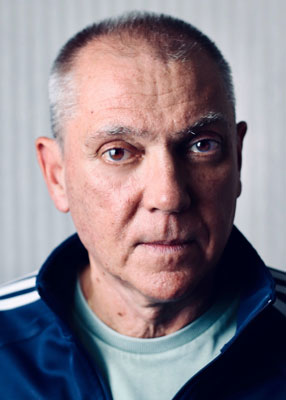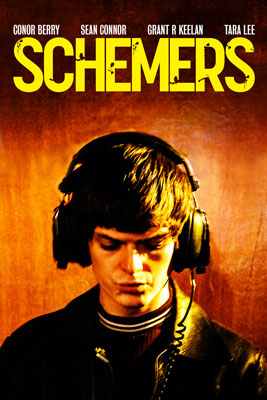DAVE MCLEAN

A Life of Sonic Scheming: Confessions of a Promoter
Interview by Daniel Hess
(June 2022)
Rock promoter Dave McLean has worked with some truly legendary acts over his amazing career, including the likes of Mudhoney, Nirvana, Sonic Youth, and The Smashing Pumpkins, just to name a few. It all started in the late 1970s in Dundee, Scotland. Over a Zoom interview, I had the chance to talk to him about his early days getting into the industry all the way through to where things are now with his career, including his budding filmmaking forays. His new film Schemers looks back at those early days and the origins of what would become a lifetime steeped in endless musical stories to share.
PSF: So, the main impetus for getting into music was to impress a girl?
DM: That's it, absolutely true. That was my goal. Nothing else.
PSF: How was the initial process for you back then?
DM: It was just ridiculous. Number one, we put a disco together; I suppose you could call it a club night now. I was meant to sell the tickets because I couldn't speak to her. So, we had to come up with a device whereby I could speak to this girl. My mate and me were running the football team, so we first got the idea for the disco to help raise money for that. He told me I could sell the tickets. People said tickets were too expensive, so I put them on the guest list. I put them all on the guest list, [and] when I went back to John, he asked me how it went. I said great, she's coming and when he asked about if I sold any tickets I said 'no, but I put them on the guest list.' He said 'well that's not a very good business model.'
At that time, we were putting together these disco nights and paying 50 pounds for the DJ, then making 1000 pounds from the event. It was great, we even had this DJ, Micky Moppet, who would come out. It wasn't cool though, really, the bands were cool but you would spend 1000 pounds on the band and not make any money.
All because of a girl.
PSF: How did you keep growing despite the “poor business model?"
DM: It was mad. It went from bad to worse really. We did all the cool bands at the time and we got into debt. Just like in the movie, we had to put on a big gig to pay back the people who had loaned us money. By some kind of mad quirk of fate, we ended up booking Iron Maiden at Caird Hall in Dundee on June 12th, 1980. At the time, it was before social media but there was just a buzz that they were gonna be big. That's all, just a slight buzz in my ear. We had only sold 200 tickets in advance and, like in the film, I didn't do anything to promote it. My dad noticed the posters I hadn't put up yet and, two days before the show, we went out and hung them around town. God must have been smiling on me because there was an 1100 person walk up on the day of the show. We ended up making money there and paying off the debts that we had.
However, with my business acumen, I took the money we had leftover and thought I'll go to the casino. I ended up losing it all in like one minute.
PSF: After a show like that, were you then able to start working with bigger artists?
DM: I thought, basically, I could conquer the world after that. My wife at the time was telling me that I needed to go to London. So, I went to London and I thought, 'I'll get a job, easy. I'll take over London, no problem.' I ended up getting a job in the local council. I ended up booking novelty acts, artists you would've never heard of. Doing things like the bingo night. I was dressed up in a dinner suit with a bowtie calling bingo numbers. I was living the dream.
Then though, they started letting me book my own acts. I ended up booking lots of reggae artists at the time. I was booking loads of great acts, but I ended up getting fired because my boss didn't like what I was doing.
I was able to get another job fairly quickly, over at student union, booking really cool bands. Then I got fired from that job in 1987, since my boss didn't like the way the show was going with The Pogues. It was a bit riotous and all that. She had a go at me and, in self-defense I threw a mobile phone, which in those days was the size of a brick, and it hit her on the head. So, I was fired from that job.
After that I spent six months with no job. I ended up getting a gig at The Greyhound in Fulham. It wasn't the greatest place, you know, a pub with that sticky carpet, a dump really. The guy that ran it though, Duncan Ferguson, had said to me 'son, you might think this is a comedown for you, but let me tell you the bands I promote are big.' I said who and he showed me the stuff he had done. AC/DC, Jimi Hendrix, The Rolling Stones, Bob Marley... He said Bob Marley played here for six quid.
I got that gig and ended up booking acts like White Zombie, Sonic Youth, all that stuff. Luckily, through that we got Nirvana, I never put them on at the Greyhound, but I just started getting involved in that American scene. I literally stumbled into it.
The rest is history, it went great, ya know?
PSF: I do have to specifically ask about Nirvana. How was that experience of meeting them?
DM: The first time we had them on, we paid them fifty pounds. The last time we were going to promote them, it was half a million. All I remember about them is it's quite funny. Everyone says Dave Grohl is the nicest man in rock and he is, he's awesome. Kurt and Krist with Dave were a great team. Kurt was very funny. He was great with one-liners. He wasn't like in-your-face wacky like Dave is. We used to go into the tour bus, and Kurt loved ABBA. So, we'd go on the tour bus after a gig and he'd say “let's get ABBA on." So, all three of them would be singing “Dancing Queen" on the bus.
We were going to do Milton Keynes Bowl, which was 100,000 people. Kurt had picked a bill that was going to be Nirvana, Bjork and he heard an ABBA cover band which was called Bjorn Again. That is who he wanted on the bill.
PSF: So, what was it that got you involved with Placebo and managing them?
DM: Well, it was really weird... things were going well with booking these large acts like Stone Temple Pilots, Rage Against the Machine, Nirvana, Green Day. It was great, but then of course Kurt died. I felt like we will never really get another band as big as that again. I kind of lost the love for promotion.
We kept going along for a few years after that though. My heart really wasn't in it after that, though. To be fair, I should have stuck with it because so many of these bands are still huge.
We got a demo from a band called Placebo with six tracks on the demo. Five out of those six songs ended up going top 30 in the UK charts. So, it was a pretty good demo. We got involved with them and thought 'let's get into the management side.'
27 years later, they're still going and have a US tour in 2022 and selling tickets to the point of adding extra show nights in cities like New York. It was just pure luck, they just came through the door and here we are.

PSF: What was the process like of getting a bit of your life story made into a film?
DM: Everybody kept telling me “Dave, you've got lots of stories, write a book", but a book is too hard for me, it takes too long. So, I'll just make a film. The thing about film is that if you get a good DOP (director of photography) it will look good, if you get a good audio team. it will sound good. Even if the script is absolute torture, at least it will look good and sound good. On the other hand. if the script is half decent, you've got a solid film.
Obviously, I had to get the financing once the script was done. I put money in, my business partner put money in, my doctor put money in, and my accountant put money in. That's how we got the money and from there we just put it all together.
It came out and was number one in the new release box office in the UK. Then, with the pandemic, all the cinemas shut down. It was set to release all over the world. It didn't put me off from the medium, though, as I'm gearing up for another three films.
PSF: What are the future projects to come then?
DM: The next film is going to explore the experiences I had in London. It's pretty sad, pretty dark, but also has some humor to it too. It shows all the bands I used to put on at that time. The soundtrack is going to be great, lots of amazing people involved. It's going to be brilliant. The plan is to start filming in September.
PSF: That is quite the journey you've been able to take in life.
DM: Well, it keeps you young. A lot of these artists that I work with now are between the ages of 18 to 22 and, even though I'm ancient, I kinda feel like I'm still 18 in a way. Sometimes I feel like this Christopher Lee vampire character. It keeps you young. It's a good business to be in.